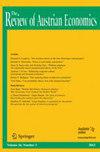The wisdom of classical political economy in economics: incorporated or lost?
IF 0.4
Q4 EDUCATION & EDUCATIONAL RESEARCH
引用次数: 1
Abstract
Is everything good in political economy incorporated into modern graduate education in economics? With the transition of the art of political economy into the science of economics, there was a significant narrowing of graduate education curriculum. The prevailing technique in economics, a neoclassical framework focusing on formal empirics, gradually compressed artistic components of economics, including philosophical underpinnings, democratic justifiability, theoretical intuition, comparative institutional analysis, and political economy. Courses on the history of economic thought, which historically played a role in introducing graduate students to the complexities of the art of political economy, are now only offered as an elective. This paper argues, however, that there are still insights to be gleaned from studying the classics of political economy in graduate education. We highlight the tradeoff between theoretical cumulativeness and knowledge, arguing that significant insights from historical works of political economy are often absent in contemporary technical expositions of economics. We explore examples of useful knowledge in political economy that was lost in the transition away from the art of political economy. To remain an operationally valid social science, economists should reintroduce the artistic elements of political economy into the graduate training of economists.经济学中古典政治经济学的智慧:被吸收还是被遗失?
政治经济学的一切好东西都融入了现代经济学研究生教育吗?随着政治经济学艺术向经济学科学的转变,研究生教育课程明显缩小。经济学中的主流技术,一个专注于形式经验主义的新古典主义框架,逐渐压缩了经济学的艺术组成部分,包括哲学基础、民主正当性、理论直觉、比较制度分析和政治经济学。经济思想史课程在历史上曾在向研究生介绍政治经济学艺术的复杂性方面发挥过作用,现在只作为选修课提供。然而,本文认为,在研究生教育中学习政治经济学经典仍然有一些见解。我们强调了理论积累和知识之间的权衡,认为在当代经济学的技术论述中,政治经济学历史著作中的重要见解往往是缺失的。我们探讨了政治经济学中有用知识的例子,这些知识在脱离政治经济学艺术的过程中丢失了。为了保持一门有效运作的社会科学,经济学家应该将政治经济学的艺术元素重新引入经济学家的研究生培养中。
本文章由计算机程序翻译,如有差异,请以英文原文为准。
求助全文
约1分钟内获得全文
求助全文
来源期刊

Review of Austrian Economics
EDUCATION & EDUCATIONAL RESEARCH-
CiteScore
1.80
自引率
14.30%
发文量
39
期刊介绍:
The Review of Austrian Economics has two broadly conceived objectives: (1) to promote the development and extension of Austrian economics and (2) to promote the analysis of contemporary issues in the mainstream of economics from an Austrian perspective. Officially cited as: Rev Austrian Econ
 求助内容:
求助内容: 应助结果提醒方式:
应助结果提醒方式:


